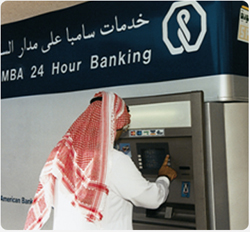 Jeddah, Jun 20: Saudi banking experts here say that the Kingdom has the safest banking system in the Arab world. This comes in response to CNBC Arabia reporting earlier this week that the Kingdom recorded 5,000 fraud cases out of 1.3 million ATM cash withdrawals recently.
Jeddah, Jun 20: Saudi banking experts here say that the Kingdom has the safest banking system in the Arab world. This comes in response to CNBC Arabia reporting earlier this week that the Kingdom recorded 5,000 fraud cases out of 1.3 million ATM cash withdrawals recently.
The experts say that the security of the Saudi banking system and its top ranking in the Arab world has been confirmed by the Financial Sector Assessment Program (FSAP), the International Monetary Fund and World Bank’s assessment of a country’s financial system.
The banking experts also expressed concerns about a proposal to launch a single Gulf Cooperation Council (GCC) banking system because of the alleged poor security standards of many banks in other GCC countries.
Talat Hafiz, secretary general of the media and banking awareness committee of Saudi banks, confirmed that Saudi Arabia ranked number one in the region, particularly for its ability to fight money laundering. “Saudi Arabia’s banking system is considered the safest in the Arab world.” He said that Saudi banks still insist on customers updating their information in person rather than on the phone or online. “Saudi banks are applying the most well known international system to protect information and their databases,” he said.
“Despite the huge annual transactions in Saudi Arabia, there are very few complaints in terms of credit cards, visa cards, online payments, or ATM cash withdrawals.”
According to Hafiz, there have been less than 2,000 cases of fraud involving ATMs, despite the many machines across the country. He said most fraud cases have involved women involved in online shopping.
“We often advise women customers, who are involved in online shopping, to make sure they are doing transactions with genuine operators. We’ve noticed that most fraud cases have come from online shopping,” he said.
Hafiz said most Saudi banks offer integrated services including Internet banking, ATM and telephone-based services.
“Since more clients want to transact electronically, customers in Saudi Arabia are now moving into electronic banking, but the move is gradual. A lot of customers, especially elderly people, need to be aware of the electronic process.”
He said, however, that more awareness campaigns are needed to educate people about safe banking behavior.
Fadhul Albuainain, a banker and economics writer, said that money laundering and fraud cases would increase if the Kingdom joins other GCC banks in a single system.
He claimed that banking security in other countries such as Qatar and Kuwait is not strict, which has resulted in problems in those countries.
“Since we have a large number of expats, many ATMs and a huge number of transactions, it is dangerous to integrate with other banking systems in the GCC or other Arab countries,” he said.
“We have succeeded in fighting money laundering and financial fraud cases, unlike in the GCC and Arab countries.”







.jpg)
.jpg)
Comments
Add new comment